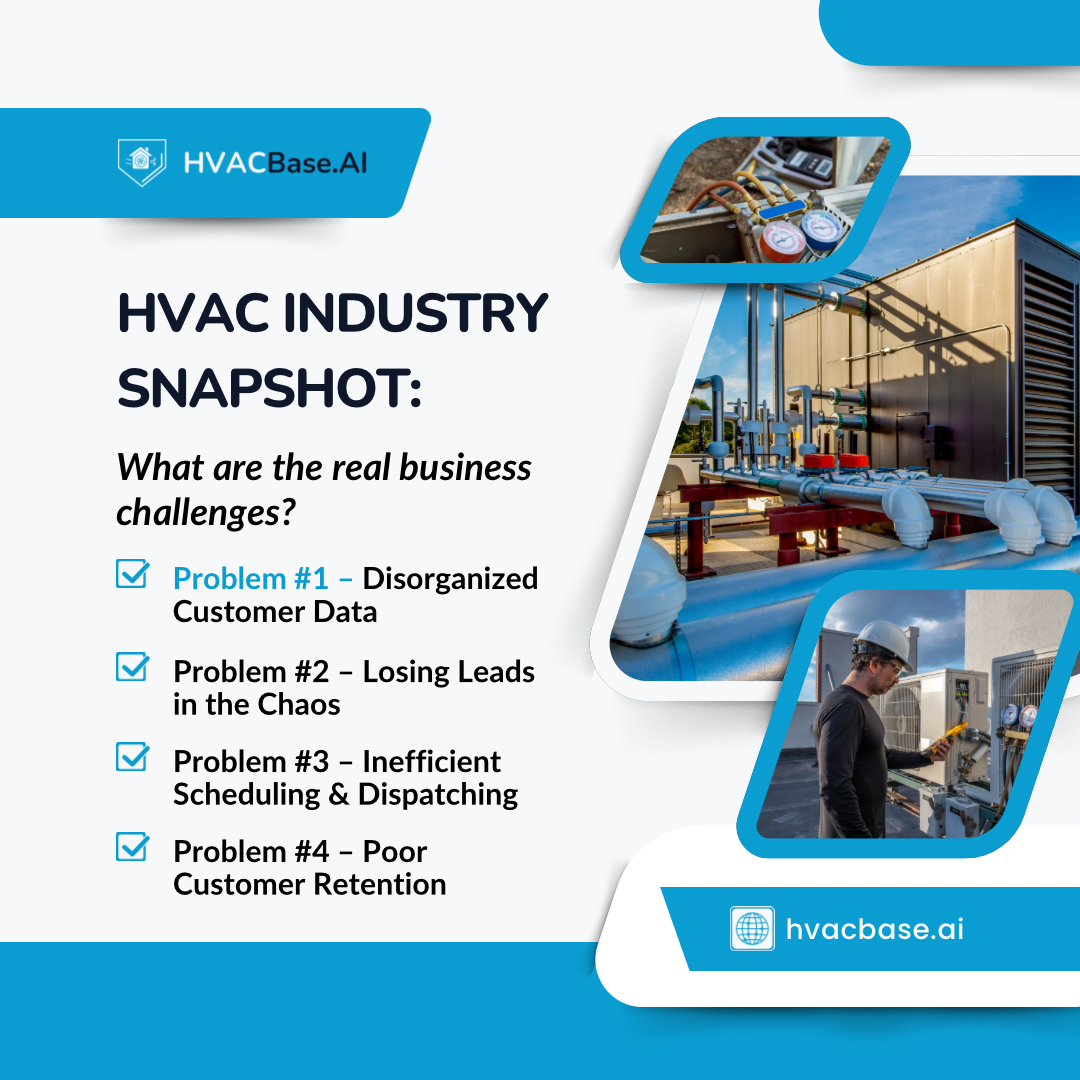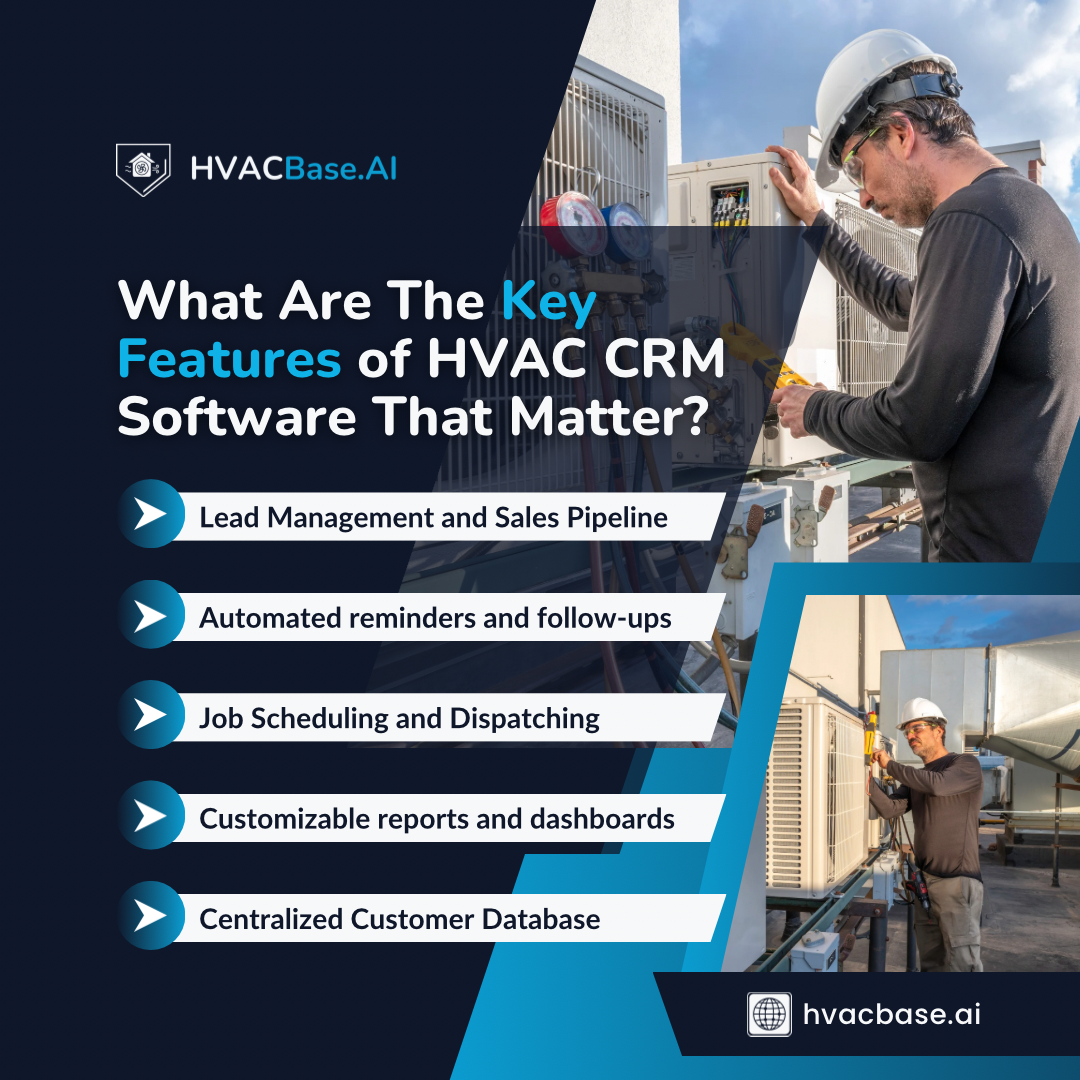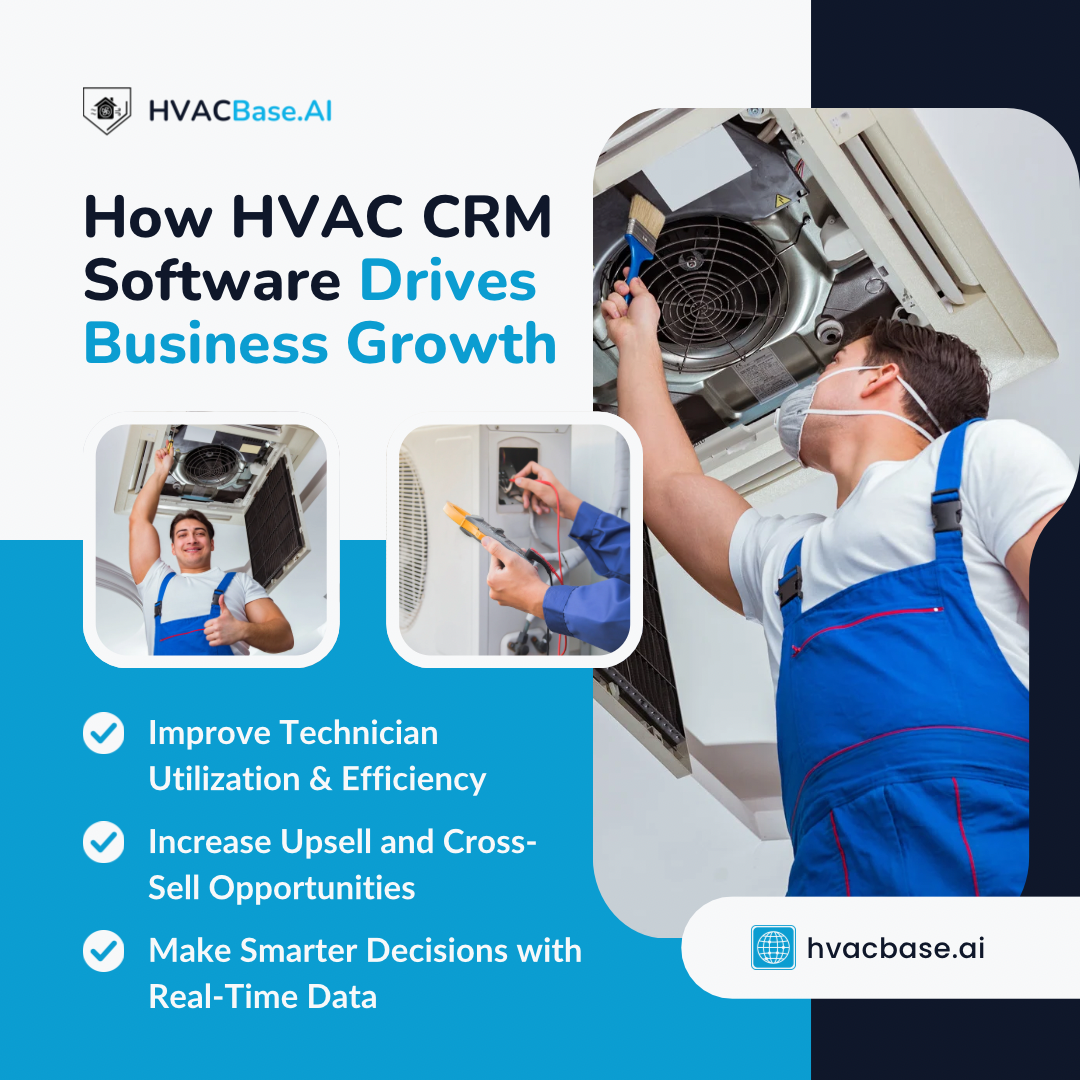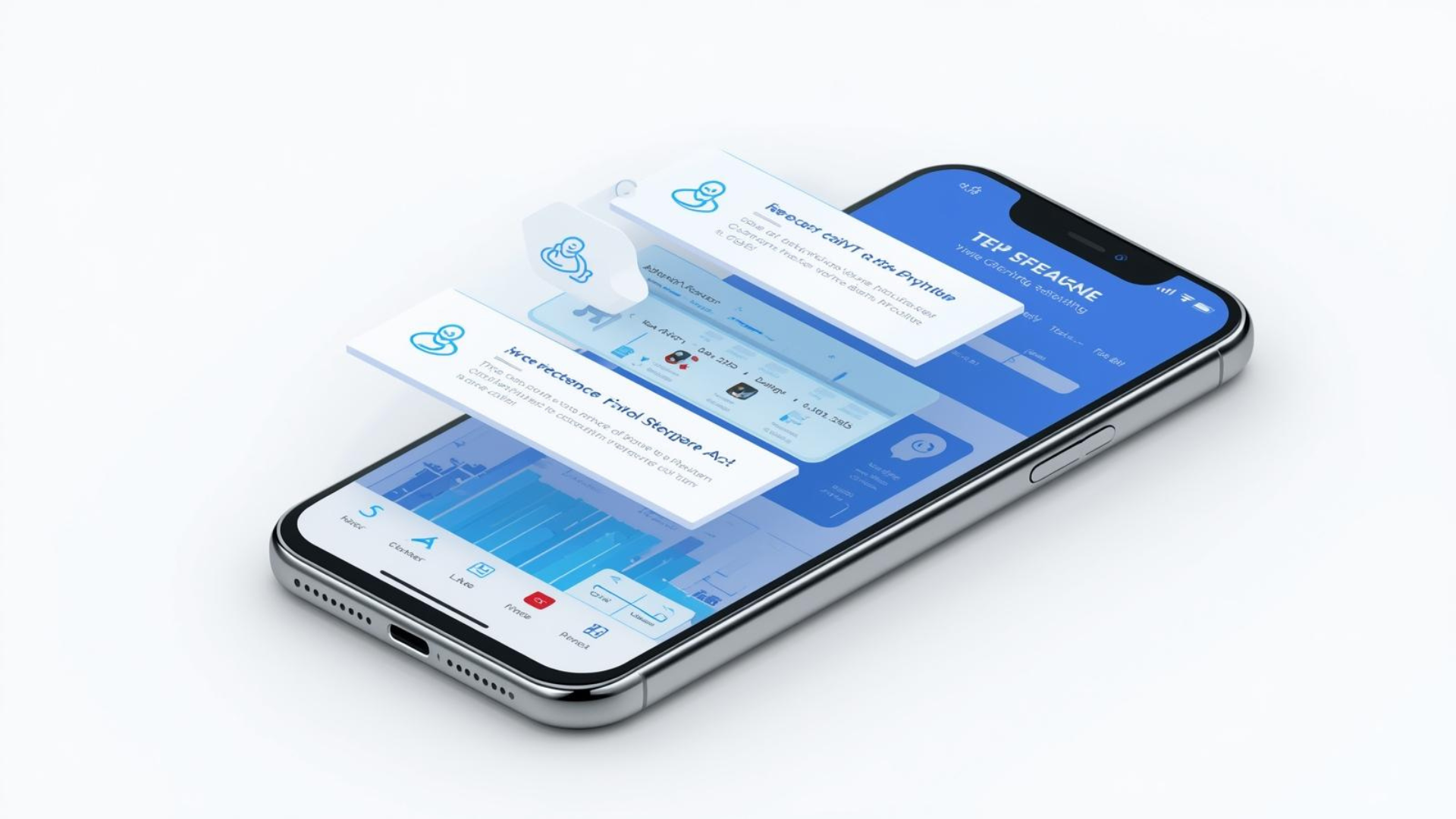What is HVAC CRM Software and How Can It Grow Your Business?
Audio Overview: Listen & Learn
Imagine: A customer calls for a repair, but no one answers. They don’t leave a message or call back, and instead, they will contact your competitor.
That missed call? Honestly, it didn’t just cost you a service fee. It costs customer dollars spent on maintenance, repairs, and referrals, along with unseen damage to your reputation.
For small to mid-sized HVAC businesses, the challenge isn't finding work but managing it without losing leads or making customers feel forgotten. Skipped appointments, scattered paperwork, unreturned quotes, and miscommunication are quietly cooling your business.
The smart alternative? HVAC CRM software is the only switch you need. In the next few minutes, you will learn how HVAC CRM software transforms your stressful operations into efficient and profitable systems.
What HVAC CRM Software Is and How It Can Help You Grow?
HVAC CRM (Customer Relationship Management) software is a specialized solution designed for heating, ventilation, and air conditioning companies, enabling them to efficiently manage customer interactions, organize job schedules, track sales pipelines, and facilitate seamless team communication all on one platform.
Key Takeaways
- The HVAC industry faces several challenges, including disorganized customer data, loss of leads, inefficient scheduling and dispatch, and poor customer retention.
- HVAC CRM software streamlines your business operations from managing leads and scheduling jobs to automating follow-ups and tracking payments.
- The software offers key features such as lead management, automated reminders, job scheduling, a centralized customer database, estimates, invoicing, payment tracking, and additional functions.
- The top five HVAC CRM software options in the market include HVACBase, Jobber, ServiceTitan, ServiceTrade, and Simpro.
- Selecting the ideal HVAC CRM software: essential questions to ask, key features to evaluate, analyzing pricing structures, and implementation considerations.
HVAC Industry Snapshot: What are the real business challenges?

> The Growing HVAC Market in the U.S.
In 2023, the U.S. HVAC systems market was valued at USD 30.41 billion and is expected to expand at a compound annual growth rate (CAGR) of 7.4% from 2024 to 2030. (Source: Grand View Research)
This growth is driven by rising global temperatures and severe weather, which is expected to boost demand for efficient climate control systems in the next decade.
Nonetheless, growth introduces its own set of challenges. Let’s take a look at the biggest challenges that the smallest to mid-sized HVAC businesses face daily.
Problem #1 – Disorganized Customer Data
Your top customer calls with an emergency. You remember servicing their system before, but where's the information?
Maybe it's just some notes on your phone, a few paper files, or possibly a couple of spreadsheets?
And while you look into their service history, your customer gets increasingly frustrated, your technician faces delays for the next job, and your professionalism is called into question.
Problem #2 – Losing Leads in the Chaos
Quick question: How many potential customers contacted you last week? Here's the tougher question: How many of those calls resulted in paying jobs? Oops!
Forgotten!
This happens more often than you realize. In reality, many businesses miss out on leads not because of a lack of interest, but because they do not follow up.
That's like wasting money and funds you've already invested in marketing to reach those leads initially.
Problem #3 – Inefficient Scheduling & Dispatching
When your technician is running late due to poor scheduling, it not only impacts that one customer. It postpones every appointment for the rest of the day.
Your 2 PM customer turns into your 4 PM customer, who becomes upset when you arrive during dinner time. Negative reviews arrive, leading to a decline in referrals.
Problem #4 – Poor Customer Retention
You did a great job last year. However, did that customer return this season?
Many HVAC companies focus solely on acquiring new customers and overlook those they have already impressed. That’s a lost opportunity for profit.
Ultimately, you are either gathering information, rescheduling, or persuading your customer.
That's when you recognize that what you really need is what your competitors are using: HVAC CRM!
What Exactly Is HVAC CRM Software? (And Why It's Not Just Another Gadget)
First, let's take a look at some customer stats:
| Customer | Statistics |
|---|---|
| Retention | Repeat clients spend 67% more than first-time buyers. |
| Expectations | 70% of customers view quick responses as a sign of good service. |
| Service | 62% of dissatisfied customers may switch to your competitor after poor service. |
Now, how can customer relationship management (CRM) software help you in every way?
Understanding the basics
> The "C-R-M" Breakdown
- C = Customer: This refers to anyone who has called, may contact, or should contact you.
- R = Relationship: This is your history, preferences, and interactions with each customer.
- M = Management: This system helps you organize, track, and act on customer information.
> HVAC CRM = Specialized CRM built for HVAC contractors
Standard CRMs are designed for any business, while HVAC (Heating, Ventilation, and Air Conditioning) CRMs are specifically tailored for the HVAC industry.
An HVAC CRM software helps manage customer relationships, operations, and overall service delivery. These tools provide precisely what you need, including
drag-and-drop scheduling, technician tracking, maintenance reminders, and seamless workflows from estimate to invoice.
No unnecessary features, just practical solutions tailored for HVAC teams.
Why Generic CRM Isn’t Enough For the HVAC Industry?
> Pitfalls of using general-purpose CRM tools
Sure, you can use a basic CRM platform, but you’ll ultimately end up taking on more work than you initially expected:
- Inputting job details manually
- Switching among tools for scheduling, dispatch, and payments
- Wasting time trying to “customize” it to your industry
Well, you aren’t a software developer. You need software.
> Why HVAC businesses need industry-specific workflows
Your business operates differently from a typical sales company. HVAC-specific CRM understands things like:
- Handling emergency vs. scheduled calls
- Preparing for seasonal demand shifts
- Leveraging service-to-sales opportunities
- Best: It provides access to the necessary technical documentation.
Find out the Best Strategies for HVAC Service Companies to Succeed in a Competitive Market
What Are The Key Features of HVAC CRM Software That Matter?

Statistics you can’t overlook:
HVAC is a profitable industry that offers steady employment opportunities. Every year, around 3 million HVAC units are replaced, along with millions more that require replacement in homes throughout the United States.
Here's how a CRM can help you manage this growing demand.
1. Lead Management and Sales Pipeline
Let's begin with the big question: How many potential customers do you lose each month? If you aren't aware of the exact number, that is already problem number one.
A good HVAC CRM helps you to capture, track, and nurture every lead from the moment they call, fill out a form, or message you.
Whether a homeowner requires AC repair or a builder needs a complete HVAC system installation, the CRM ensures everything stays organized.
2. Automated reminders and follow-ups
Did you know? Research indicates that 79% of marketing leads do not convert into sales due to insufficient lead nurturing.
How often do you find yourself thinking, "I need to return that customer's call," only to be distracted by an urgent call? We've all experienced that.
Automated reminders handle the details. Whether it's sending a service maintenance alert to a customer or reminding a tech about an upcoming appointment, automation keeps everything running smoothly. Your team seems more professional and responsive without extra effort.
3. Job Scheduling and Dispatching
Many HVAC companies face challenges in this area. Efficient HVAC scheduling and dispatching is not just about filling the day; it’s about optimizing every minute, mile, and dollar.
With the right HVAC field service software, you can schedule jobs in just a few clicks, assign them to the correct technician, and even account for travel time.
Specific CRMs, such as HVACBase, offer user-friendly drag-and-drop calendars and provide real-time updates.
4. Customizable reports and dashboards
Let's discuss the difference between data and insights, where data doesn’t have to be dull.
Your business generates tons of data every day, including phone calls, completed jobs, parts used, and payments received. However, raw data alone doesn't enable better decision-making. Insights do.
The advanced HVAC CRMs offer visual dashboards that display key performance indicators (KPIs), including job completion rate, revenue per technician, and lead conversion speed. You decide what data matters, and the CRM brings it to life.
5. Centralized Customer Database
Your team spends time searching for service history, warranty details, or even customer addresses. However, when data is disorganized, it becomes challenging to keep up with tasks.
In the meantime, the customer is waiting and already thinking about your competitor!
HVAC CRM software offers a unified platform for managing all customer interactions. It includes service history, warranties, equipment models, and contact preferences, ensuring everything is in one place.
6. Estimates, Invoicing, and Payment Tracking
Receiving payments shouldn’t be a hassle. But, how much time do you spend tracking down payments from customers who appear to have selective memory regarding overdue invoices?
CRM is equipped with integrated HVAC invoicing software, estimating and payment tools that allow you to generate professional quotes on-site, swiftly convert them into jobs, and invoice with ease in just one click.
This results in faster cash flow, fewer billing errors, and happier clients (who don’t like confusion).
7. Mobile Access for Technicians
Mobile accessibility is the best asset technicians can have, and having an HVAC mobile app that supports it makes a big difference.
Mobile-friendly CRMs allow technicians to view job details, obtain directions, update job statuses, and collect signatures, all using their phone or tablet.
The features we just discussed are, in practical terms, solutions to the specific challenges that keep HVAC contractors awake at night.
Use Cases: How HVAC CRM Software Drives Business Growth

You understand what HVAC CRM software is and what features it includes.
But you're probably thinking, "How does this work in the real world? How does it translate into more money in my bank?"
Consider this as your "show me the money" section.
1. Improve Technician Utilization & Efficiency
Do you ever think your team could do more in a day? With HVAC CRM, you can absolutely do so.
- Minimize downtime through intelligent routing and scheduling.
- HVAC technicians can update job status, upload images, and obtain signatures while on the go.
And here's the part that matters: Your technicians are more productive and less stressed. No more hurrying through traffic or arriving late. They arrive on time, are well-organized, and are focused on delivering exceptional work.
2. Increase Upsell and Cross-Sell Opportunities
The issue isn't that your technicians lack expertise; rather, they don't have a full understanding of the customer's situation while in the field.
How does CRM help?
- It tracks past purchases and service history.
- Technicians may recommend prompt upgrades or additional services during their visits.
With this information, they have the perfect opportunity to pitch a maintenance plan or system upgrade, without being pushy, of course.
3. Make Smarter Decisions with Real-Time Data
You gain an advantage here!
- Dashboards display performance metrics, including conversion rates, job completion times, and top-performing techs.
- Leverage data to improve pricing, promotions, and staffing strategies.
- Forecasting tools assist in planning for busy seasons.
You’re not only looking at past performance; you're also looking at insights to help you evolve.
Read more about the reasons Why D2D sales thrive in sectors like HVAC, solar, and real estate.
5 Best HVAC CRM Software in the Market

Here are the Top 5 leading HVAC CRMs in the market:
1. HVACBase
HVACBase is an all-in-one HVAC software solution. It helps you track and manage all your leads, automate follow-ups, monitor service history, send quotes, handle maintenance contracts, and improve communication with your customers. In a nutshell, everything you might need help with.
Best for:
- HVAC Commercial, Residential, and Small Business
Key Features:
- Centralized customer data enables access to contact details, service history, notes, invoices, and communications.
- Automated reminders, quote follow-ups, and service alerts for quick response.
- Real-time data sharing between technicians and office staff.
- Schedule jobs, assign technicians, and automate follow-ups to reduce no-shows.
- Document and file storage for organizing job-related documents, signed contracts, before-and-after photos, and service manuals within each customer profile.
- Built-in Customer Communication keeps all correspondence logged under each contact or job.
Complexity and Usability:
- Provides intuitive and easy mobile app or browser access for technicians on the move.
- The software is easy to learn and set up, even for individuals with limited technical experience.
Integrations:
- Integrates seamlessly with accounting software, such as QuickBooks, marketing tools, dispatch apps, and even HVAC design software.
Pricing:
- Book a personalized demo here or talk to HVAC experts to learn more about pricing details.
2. Jobber
Jobber’s HVAC service CRM allows you to effectively manage and organize client information, service history, and communications. With Jobber as your HVAC service software, field technicians can access important customer details directly, reducing the need for frequent office calls.
Best for:
- Small to Mid-Sized HVAC Companies
Key Features:
- A 24/7 online portal for customer service that includes work requests, estimates, job details, and payments.
- Online requests for simpler submission of service inquiries through online forms on the company's website, social media, or client hub.
- Customized quotes with company branding and line item images.
- Online payment options include credit cards and bank transfers.
- Automated emails and messages to inform customers.
Complexity & Usability:
- A user-friendly interface is available on both desktop and mobile devices.
- The Jobber app allows technicians to manage jobs, update schedules, and communicate with clients from smartphones.
Integrations:
- QuickBooks, Mailchimp, and Zapier
Pricing:
- Their pricing information is available here.
3. ServiceTitan
ServiceTitan is a comprehensive software solution designed for HVAC contractors who prioritize quality and efficiency. It includes top-notch estimating tools, reporting capabilities, and robust customer management features, ensuring that it meets all your needs.
Best for:
- Residential, Commercial, and Construction HVAC Business
Key Features:
- Call booking features that instantly capture customer data.
- Customer-focused scheduling and dispatching features that enhance profitability.
- Tools that improve customer experience and boost satisfaction.
- Instant payment options that empower customers and generate revenue rapidly.
- Reporting tools that monitor performance and maximize upselling opportunities.
Complexity & Usability:
- A mobile app that facilitates communication among technicians, the office, and customers.
- ServiceTitan is considered user-friendly, but some users note a steep initial learning curve, particularly when setting up and understanding all its features.
Integrations:
- Integrates with QuickBooks Online and QuickBooks Desktop Premier and Enterprise editions.
Pricing:
- Book a demo here to learn about their pricing.
4. ServiceTrade
ServiceTrade is a specialized field service software for commercial service businesses. It offers scheduling and dispatching tools, a mobile app for technicians, business management analytics, and additional operational tools.
Best for:
- Commercial HVAC Contractors
Key Features:
- Optimizes maintenance and project work with less chaos using management software.
- Equips technicians with task lists to ensure proper maintenance and issue reporting.
- Control operations to eliminate issues that hinder tech productivity and introduce common risks for HVAC professionals.
- Enhances sales efficiency to secure high-margin agreements with ideal clients and generate profitable pull-through work.
- Provides an online portal that keeps clients updated to minimize service inquiries, invoice disputes, and risks.
Complexity & Usability:
- The mobile app can sometimes be slow, and some users have reported occasional crashes.
- It is generally user-friendly, but some features require a learning curve, and the user interface needs simplification in certain areas.
Integrations:
- Integrates with QuickBooks.
Pricing:
- Their pricing information is available here.
5. Simpro
Simpro is a comprehensive, cloud-based solution for field service management, specifically designed for HVAC contractors. It provides functionality for job management, scheduling, quoting, invoicing, and asset maintenance for HVAC companies of all sizes.
Best for:
- Large HVAC companies
Key Features:
- Achieves project goals within budget by utilizing efficient estimating, quotations, inventory control, progress monitoring, and billing.
- Analyzes your company’s growth through detailed and automated business reports.
- Automate the scheduling of maintenance jobs, manage recurring invoicing, and forecast asset servicing with streamlined maintenance management.
- Cloud-based project management encompasses digital forms, job cards with signatures, invoices, and applications that facilitate seamless communication between the field and office.
Complexity & Usability:
- Eliminates paper to manage tasks effortlessly in the office from a desktop or on the go from a mobile device.
- Customization is not fully developed and requires further automation.
Integrations:
- Integrates with QuickBooks, Myob, SFG20, Xero, and many more.
Pricing:
- Their pricing information is available here.
Now let's find out which one fits your team best!
Choosing the Right HVAC CRM Software: Your Decision Framework
Let's begin:
1. Key Buying Questions to Ask Your Vendor
Before signing anything, ask the tough questions:
- Is it designed specifically for HVAC, or is it a general CRM with a few added features?
- Are field techs able to use it easily on their phones?
- What does support look like: real humans or countless help articles?
- Does it work well with your other tools, such as QuickBooks or scheduling apps?
These answers will tell you if it’s actually built for your day-to-day operations.
2. Features That Matter Most to Small and Mid-Size Teams
It's not about having 100 different features; it's about selecting the right ones.
- Drag-and-drop job scheduling
- Access to customer history
- Automated reminders and follow-ups
- Real-time team tracking
- Estimates and invoices in a click
Prioritize tools that enhance your speed and reliability rather than cause overwhelm.
3. Decoding The Pricing Models
Flat fee, per user, monthly versus annual?
HVAC business software pricing can be confusing, especially when some vendors promise “low monthly fees” but conceal extra costs in add-ons.
Here’s how to decode them:
- Flat-rate plans: Easy and predictable, they are great for small teams.
- Per-user pricing: You pay based on the number of people using the system.
- Tiered plans: As you upgrade, expect more features, but watch out for “feature bloat.”
- All-in-one plan: Sometimes combine scheduling, marketing, and support into one price.
Always ask:
- Are there any hidden charges for integrations or support?
- Can I cancel at any time without penalties?
4. Implementation For Getting Your Team On Board
Even the best CRM will be of little use if your team doesn’t want to work with it.
- Start with a trial or demo.
- Easy onboarding and training resources.
- Mobile-friendly interfaces for techs.
- Hands-on support during rollout.
What sets effective HVAC CRM features apart from mere impressive claims is their capacity to save you time, increase your revenue, or enhance customer satisfaction.
Ideally, they should achieve all three.
What’s the ROI of HVAC CRM Software? Is It Worth It?
When you use a good HVAC software like HVACBase, you seize every opportunity you can.
Here's how:
- Built for HVAC Workflows: Designed for HVAC operations, combining lead management, tracking, and data.
- 360° Project Visibility: Access complete customer profiles, including job history, notes, quotes, and logs.
- Convert More Leads, Faster: Track and capture leads, send follow-ups, and close deals without missing opportunities.
- Automate Routine Activities: Use automated reminders and notifications to save time.
ROI of HVAC CRM = Increased number of jobs completed daily + reduced cancellations + quicker invoicing and payment processing + (Extra hours every week)
All of this indirectly translates into higher profits because there is no room for errors!
To cut the fluff: Staying organized helps you earn more money. So yes: it’s absolutely worth it!
To cool the air
Providing exceptional service in the HVAC business today involves more than just fixing broken ACs or installing new units; it also requires managing people, processes, and expectations.
Switching to a new system can feel overwhelming, but holding onto outdated, inefficient methods is far more expensive in the long term.
That's where CRM is an investment, not an expense! So, what's stopping you?
Upgrade Your Workflow With HVACBase
It's time to upgrade your system alongside your customers!
HVACBase CRM: Designed to deliver excellent service, foster a happy team, and drive growth!
FAQs
1. How does HVAC CRM software work?
It stores customer data, automates scheduling and dispatching, tracks job progress, and facilitates communication between office HVAC techs and staff, often through mobile apps.
2. Which is the best CRM for HVAC companies?
The top HVAC CRM software includes: HVACBase, ServiceTitan, Jobber, ServiceTrade, Simpro, Housecall Pro, Commusoft, and FieldEdge.
3. Why should HVAC companies use HVAC CRM software?
Customer management tools enable HVAC companies to expand, optimize operations, enhance customer service, and increase efficiency by centralizing customer data and automating tasks.
4. How difficult is it to transition from manual processes to an HVAC CRM?
Shifting from manual methods to an HVAC CRM system can be difficult, yet it offers significant long-term advantages. The difficulty varies based on factors such as the CRM's complexity, the organization's scale, and the amount of data migration required.
Have questions or need personalized advice?
Talk to an Expert Today and let our construction specialists guide you to success.






